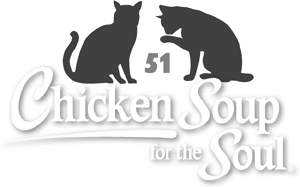

Fun fact: Kittens enter their primary socialization period at two–three weeks of age. This is when the brain is primed for attachment to other beings.
We have no idea when Poppy, our Golden Retriever, had her rendezvous but by mid-summer it was quite evident that she had been naughty. When our vet confirmed that Poppy would soon present us with a litter of grand-puppies we were at first stunned but that soon gave way to excitement. Since we had no idea whom our naughty girl had seduced we were eager to see what her pups would look like.
On the Fourth of July the local fireworks were forgotten when Poppy went into labor. Leave it to Poppy to upstage the annual celebration. The sound of distant fireworks heralded in the birth of her three pups. Their parental lineage still escaped us. One short-haired male was brown and white, his brother had a long silky coat like Poppy but was black, and their sister looked a lot like Poppy, right down to her golden fur. Tired but exhausted, Poppy beamed first at her babies at then at us, clearly delighted in the fuss we were making over her and her pups.
My husband, Joe, came in from feeding the horses one morning, scowling as he cradled something against his chest. “Some people,” he muttered, as he showed me a tiny, frightened calico kitten that was small enough to nestle in one of his big hands. We live in the country and it isn’t unusual to find abandoned pets, but we never get used to the callousness it takes to leave an animal on its own to slowly starve or become wild. The most heartbreaking of all is to find babies who either were tossed out to die or whose mother was killed.
“I couldn’t find any more,” Joe said. “The mother and any other kittens that there may have been are most likely dead. This one wouldn’t have made it much longer.” He put the kitten in my hands. “I’ll go into town and get a dropper and some formula. She might make it if we can get some food into her soon.”
While Joe was gone I found a shoebox and an old soft receiving blanket and made a bed for the kitten. In a few days she was putting on weight and mewling happily when I took her out of her bed to be fed and cuddled for a while.
Poppy’s puppies were getting fat and beginning to frolic, though never venturing far from her watchful eye. One morning, out of curiosity, I placed the kitten next to the pups to see how they would react to each other. The pups looked curiously at the funny little thing that made such odd sounds. They examined her for a few moments, then lost interest and wandered back to Poppy for some milk. To my surprise the kitten followed the pups timidly, mewling all the while.
When Poppy saw her brood approaching she dutifully lay down so they could nurse. She eyed the kitten and decided the tiny thing posed no threat to her pups, so she relaxed and turned her attention to her babies as they nuzzled around for a spot to nurse. To my surprise, the kitten started pushing forward between two of the pups, instinctively knowing what her reward would be if she could snag a teat.
I jumped up, ready to snatch her away. I didn’t know how Poppy would react to this intrusion. Poppy looked alarmed for few seconds as if she didn’t know how to react either. She looked up at me for guidance. I patted her head and talked softly to her. “It’s okay, girl. She’s just another hungry baby.”
I never had to feed the kitten after that. Poppy totally accepted her into her family. As time went on Poppy became very protective of her special baby. And the kitten followed the pups everywhere they went and seemed to think that she was a puppy too. We began to call her Rover because she clearly identified with the dogs.
When Poppy watched her babies play she kept a close eye on Rover, who was diminutive next to her large puppies, who turned out to be part Husky. Often, if one of the pups got too rough with Rover, Poppy would run over to inspect her smallest baby to make sure she was all right. Then she would give the offending sibling a warning look.
Initially we had planned on finding a home for Rover when she was weaned. But Poppy got so attached to her little calico “puppy” that we didn’t have the heart to separate them. To this day the two of them are inseparable. And Rover still thinks she is a dog.
~Elizabeth Atwater
